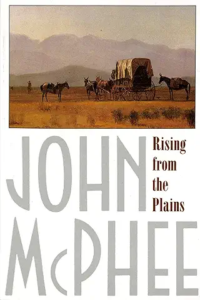Rising From The Plains by John McPhee 1986
John McPhee is on my very short list of favorite writers whose entire oeuvre I have collected and mostly read. Along with the novelists Georges Simenon, John Updike, Saul Bellow, Philip Roth, Norman Mailer, and Ernest Hemingway and the poet Donald Hall, McPhee along with Geoff Dyer is the non-fiction writer in this category, and his 41 books published from 1965 to 2023 rest comfortably and lovingly on a shelf in our Vermont guest house. He is a rather amazing writer, both in terms of longevity (His last book was published when he was 92!), breadth and depth of topics, and uniquely engaging style, and I’ve loved each and every one of his books, from my thrice read favorite (“Coming into the Country” about Alaska) to his last book, “Tabula Rasa”, a personal reflection on his writing career and about topics that he had planned to explore but never got to.
McPhee is famous for selecting a very focused and specific topic, e.g. the orange juice industry in Florida, the Swiss Army, the New Jersey Pine Barrens, and then doing exhaustive research and writing a detailed, informative, and fascinating book. What makes these potentially dull topics of great interest is that he structures his book around a particular individual weaving together that person’s personal history and the topic/world of which they’ve been a part. His most extensive dive into a topic involved geology, and this book is the third in the geology series following “Basin and Range” and “In Suspect Terrain”. Eight years after its publication, he combined “Rising from the Plains” with the two prior books as well as “Assembling California” and a new fourth section into the Pulitzer Prize winning volume “Annals of the Former World” published in 1999.
Despite my love of McPhee’s work, I found this particular book to be a bit of a slog. The characteristic incredibly detailed descriptions of the geology of Wyoming included dozens of references to geological eras (Paleozoic, Mesozoic, and the rest which I’ve never been able to keep straight) and hundreds of references to different kinds of rock which left me with a toxic mix of boredom, confusion, and a strong desire to re-shelve the book. It may be that geology, more than any of the topics of his other books, fascinated McPhee so that he somewhat lost perspective. What prevented me from dropping this book was the other element typical of McPhee’s style, his detailed and totally fascinating story of the life of John David Love who accompanied him on the drives and hikes through the Wyoming basins, road cuts, and mountains.
The book begins promisingly with the story of a young woman, a Phi Beta Kappa graduate of Wellesley College, who gets off a train in 1905 in Rawlins, Wyoming to begin a 30 hour stagecoach ride through empty countryside, frigid temperatures, and drifting snow to take up her job as school teacher at the Red Bluff Ranch. There, she would teach in a 14×16 foot log cabin where her class of eight pupils ranged in age from 1 to 16, with some arriving from miles away. Soon after Miss Waxham landed in the middle of nowhere, she met a Scotsman, John Love whose ranch was 11 hours away on horseback but who wooed her successfully. They married in 1910, and three children followed, John David being born in 1913 and growing up without electricity, indoor plumbing, and other amenities until going off to the University of Wyoming and later Yale where he earned his PhD in geology. Love became a senior eminence in the U.S. Geological Survey spending his career in Wyoming and making important contributions to his field and the state. He was the first recipient of the American Geological Institute’s Legendary Scientist award.
It was in this interwoven story about Love, his life, and his geologic discoveries that I found the joy in this book. Every time I’d about had it with Precambrian eruptions, quartzite boulders and tuff, and stratigraphy and plate tectonics, McPhee would bring Love’s personal story back to the fore, and a great story it was. David Love, who estimated that he had slept out under the stars for 25% of his nights and who is perhaps best known for his discovery of the rich uranium and oil shale deposits in his native state, died in 2002 and joins the roster of fascinating characters that McPhee has met and written about from Bill Bradley playing basketball at Princeton to the modern builder of birch bark canoes. McPhee, himself, must be a fascinating and lovely man in order to receive the gift of time and sharing of life’s details from this vast array of charcters.
If you don’t know McPhee, you should definitely read his books, but I’d recommend starting with either the Bradley book or the one about the headmaster at Deerfield Academy who served for 68 years. If you love those books as I did, then perhaps it’ll be time to move on to his geology ones.



